News & activities
 News releases
News releases
2017-03-20
Press conference held after first meeting of Presidential Office Indigenous Historical Justice and Transitional Justice Committee
The Presidential Office Indigenous Historical Justice and Transitional Justice Committee held its first meeting on the afternoon of March 20. The meeting was presided personally by its convener, President Tsai Ing-wen, and lasted for about three hours. After the meeting, the committee's Deputy Convener Walis Perin (瓦歷斯.貝林) and Pasuya Poiconu (浦忠成) joined its Executive Secretary Yao Jen-to (姚人多) and Deputy Executive Secretary Icyang Parod (夷將‧拔路兒) in holding a press conference, to explain what was discussed and what decisions were reached.
The two deputy conveners stated their strong approval of the president's having stayed for the entire meeting, and having directly spoken with representatives of each indigenous group. Moreover, the fact that all the committee members were at the meeting and made substantive remarks in the meeting indicates that everyone trusts that through substantive communication and dialogue in this public platform, the committee will help to resolve problems.
Next at the press conference, Deputy Convener Pasuya Poiconu elaborated on the proceedings of the day's meeting. Under the "Reports" agenda item, Associate Professor Awi Mona (蔡志偉) of the Graduate Institute of Financial and Economic Law at National Dong Hwa University delivered a summary of his report entitled "Indigenous Peoples' Self-Government and State Negotiations: A Comparison of the Experiences of Canada and New Zealand." Also, the Council of Indigenous Peoples presented a briefing entitled "A Report on the Promotion of an Indigenous Peoples Self-Government Act." After listening to the reports, many committee members expressed hope that the proposed Indigenous Peoples Self-Government Act will lead to the thorough implementation of legally mandated procedures. In addition, the president reiterated her three-point stance regarding indigenous self-government as expressed in her August 1, 2015 statement on policies regarding indigenous peoples. First, the fundamental elements of indigenous self-government include a clearly defined spatial scope, defined self-government powers, and fixed financial resources, and these are the directions in which the government is working. Second, the organizational structure of indigenous governments must be determined through equal-status and substantive negotiations between the indigenous peoples and the national government, and cannot be decided unilaterally by the national government; accordingly, there is still a great deal of room for discussion. Third, the concept of "tribal public corporation" is a key element in self-government. The government will respect the diverse demands of each group and broadly seek the views of various tribal communities, so that the tribe will be a legal entity, and will continually accumulate its experience in, and strengthen its capabilities for, self-government.
Commenting on the "Discussion" agenda items, Deputy Convener Pasuya Poiconu noted that this meeting passed, without difficulty, the Operation Standards for the Thematic Subcommittees. In the future, five such subcommittees will be formed to study and discuss, respectively, the topics of land matters, culture, languages, history, and reconciliation. Discussion Item 2 was about the principles governing motions from the committee members. At this meeting, the committee members proposed 26 formal motions and four extempore motions. Suggested principles for handling various motions included: (1) Motions related to the duties of the committee (a total of seven motions) would be referred to the relevant thematic subcommittees and included in their work platforms for further study and disposition; (2) Motions related to concrete policies, administrative reform, or upholding of specific individual rights or privileges, and which can be handled under existing laws, or for which there is a clear agency with jurisdiction (a total of 17 motions), would be turned over to, and handled by, the Executive Yuan; (3) Motions about matters of broad import and major impact (a total of six motions) would be discussed by the committee in order to achieve a consensus.
The third motion related to "traditional territories." Deputy Convener Pasuya Poiconu stated that 17 committee members expressed opinions about this motion, and all the committee members agreed that traditional territories are a historical fact. With respect to the proposed Regulations Governing Delineation of the Land Area of Indigenous Peoples or Tribal Communities, during the meeting four committee members expressed their wish that the methods for delineation of territories be temporarily postponed; nine members supported delineation in stages, with the Regulations first coming into effect, followed by discussion of methods for delineation of land that is privately owned; another four members expressed no definite opinion. Many members expressed their approval of the work done by the Council of Indigenous Peoples in promoting creation of a legal framework. Finally, the president stated that discussion during the meeting had been helpful in clarifying the issues and was very meaningful and important, and that she was confident they could continue to work on these issues.
The president also stated six points with respect to the issue of the traditional territories of indigenous peoples:
(1) The understanding that indigenous peoples have of traditional territories is both a statement of fact and a concept of natural sovereignty. It is all about an integral spatial area, and is not a concept of ownership.
From the perspective of historical justice, traditional territories are an a priori fact, whereas the differentiation under national law of public land and private land is a matter that occurred later, so there are differences between the two. The government has the responsibility to lead mainstream society to respect and understand these historical facts.
(2) Under Article 21 of the Indigenous Peoples Basic Law, indigenous peoples are granted "the right of consultation and consent" when others intend to make use of their traditional territories. Under these circumstances, we must consider whether or not the legal delegation of power is sufficiently clear. We must also take into account social friction in the real world. The president made a special point of stating that the purpose of promoting transitional justice is to promote reconciliation among ethnic groups, not to generate antagonism. She also expressed trust that all the members in attendance agreed on this point.
(3) At present, the proposed Regulations Governing Delineation of the Land Area of Indigenous Peoples or Tribal Communities are undergoing deliberations in the Legislative Yuan. The committee respects the autonomy of the Legislative Yuan, but will record in their entirety the expressed opinions of all the committee members and send these to the Legislative Yuan for reference by legislators.
(4) One future duty of the committee is to continue to discuss the legislative direction of the proposed Indigenous Peoples Land and Sea Areas Act. Following substantial communication and understanding, it was agreed to use statutory authority to comprehensively define and confirm the method for handling the land of indigenous peoples.
(5) As suggested by Deputy Convener Walis Perin, the issues discussed in the first meeting brought into focus the necessity of clarifying the historical truth of traditional territories. It is necessary for the land matters subcommittee to continue to collect and collate historical data, so that the conception, definition, and scope of traditional territories in history can, with the revelation of even more facts, continue to be the subject of dialogue.
(6) Advancement in the realm of rule of law takes place in stages. The government will advance step by step. We believe that through the work of the committee, society will gradually come to know the history of indigenous peoples' land. For the handling of land issues, a more ideal method will definitely be found.
With respect to the final item for discussion—a motion pertaining to the Status Act for Indigenous Peoples—Deputy Convener Pasuya Poiconu noted that, due to the length of the meeting, the three representatives of Pingpu ethnic group agreed to end the discussion early, and the president then stated by way of summary that amendments to the Status Act for Indigenous Peoples are still being studied and finalized. Noting that Minister without Portfolio Lin Wan-i (林萬億), who is in charge of the matter, was at the meeting, she expressed confidence that discussion would continue to move forward, and that regional seminars would be scheduled so that there could be broad dialogue. If it was still necessary, the subject could be revisited during the next round of discussions at the committee.
The two deputy conveners stated their strong approval of the president's having stayed for the entire meeting, and having directly spoken with representatives of each indigenous group. Moreover, the fact that all the committee members were at the meeting and made substantive remarks in the meeting indicates that everyone trusts that through substantive communication and dialogue in this public platform, the committee will help to resolve problems.
Next at the press conference, Deputy Convener Pasuya Poiconu elaborated on the proceedings of the day's meeting. Under the "Reports" agenda item, Associate Professor Awi Mona (蔡志偉) of the Graduate Institute of Financial and Economic Law at National Dong Hwa University delivered a summary of his report entitled "Indigenous Peoples' Self-Government and State Negotiations: A Comparison of the Experiences of Canada and New Zealand." Also, the Council of Indigenous Peoples presented a briefing entitled "A Report on the Promotion of an Indigenous Peoples Self-Government Act." After listening to the reports, many committee members expressed hope that the proposed Indigenous Peoples Self-Government Act will lead to the thorough implementation of legally mandated procedures. In addition, the president reiterated her three-point stance regarding indigenous self-government as expressed in her August 1, 2015 statement on policies regarding indigenous peoples. First, the fundamental elements of indigenous self-government include a clearly defined spatial scope, defined self-government powers, and fixed financial resources, and these are the directions in which the government is working. Second, the organizational structure of indigenous governments must be determined through equal-status and substantive negotiations between the indigenous peoples and the national government, and cannot be decided unilaterally by the national government; accordingly, there is still a great deal of room for discussion. Third, the concept of "tribal public corporation" is a key element in self-government. The government will respect the diverse demands of each group and broadly seek the views of various tribal communities, so that the tribe will be a legal entity, and will continually accumulate its experience in, and strengthen its capabilities for, self-government.
Commenting on the "Discussion" agenda items, Deputy Convener Pasuya Poiconu noted that this meeting passed, without difficulty, the Operation Standards for the Thematic Subcommittees. In the future, five such subcommittees will be formed to study and discuss, respectively, the topics of land matters, culture, languages, history, and reconciliation. Discussion Item 2 was about the principles governing motions from the committee members. At this meeting, the committee members proposed 26 formal motions and four extempore motions. Suggested principles for handling various motions included: (1) Motions related to the duties of the committee (a total of seven motions) would be referred to the relevant thematic subcommittees and included in their work platforms for further study and disposition; (2) Motions related to concrete policies, administrative reform, or upholding of specific individual rights or privileges, and which can be handled under existing laws, or for which there is a clear agency with jurisdiction (a total of 17 motions), would be turned over to, and handled by, the Executive Yuan; (3) Motions about matters of broad import and major impact (a total of six motions) would be discussed by the committee in order to achieve a consensus.
The third motion related to "traditional territories." Deputy Convener Pasuya Poiconu stated that 17 committee members expressed opinions about this motion, and all the committee members agreed that traditional territories are a historical fact. With respect to the proposed Regulations Governing Delineation of the Land Area of Indigenous Peoples or Tribal Communities, during the meeting four committee members expressed their wish that the methods for delineation of territories be temporarily postponed; nine members supported delineation in stages, with the Regulations first coming into effect, followed by discussion of methods for delineation of land that is privately owned; another four members expressed no definite opinion. Many members expressed their approval of the work done by the Council of Indigenous Peoples in promoting creation of a legal framework. Finally, the president stated that discussion during the meeting had been helpful in clarifying the issues and was very meaningful and important, and that she was confident they could continue to work on these issues.
The president also stated six points with respect to the issue of the traditional territories of indigenous peoples:
(1) The understanding that indigenous peoples have of traditional territories is both a statement of fact and a concept of natural sovereignty. It is all about an integral spatial area, and is not a concept of ownership.
From the perspective of historical justice, traditional territories are an a priori fact, whereas the differentiation under national law of public land and private land is a matter that occurred later, so there are differences between the two. The government has the responsibility to lead mainstream society to respect and understand these historical facts.
(2) Under Article 21 of the Indigenous Peoples Basic Law, indigenous peoples are granted "the right of consultation and consent" when others intend to make use of their traditional territories. Under these circumstances, we must consider whether or not the legal delegation of power is sufficiently clear. We must also take into account social friction in the real world. The president made a special point of stating that the purpose of promoting transitional justice is to promote reconciliation among ethnic groups, not to generate antagonism. She also expressed trust that all the members in attendance agreed on this point.
(3) At present, the proposed Regulations Governing Delineation of the Land Area of Indigenous Peoples or Tribal Communities are undergoing deliberations in the Legislative Yuan. The committee respects the autonomy of the Legislative Yuan, but will record in their entirety the expressed opinions of all the committee members and send these to the Legislative Yuan for reference by legislators.
(4) One future duty of the committee is to continue to discuss the legislative direction of the proposed Indigenous Peoples Land and Sea Areas Act. Following substantial communication and understanding, it was agreed to use statutory authority to comprehensively define and confirm the method for handling the land of indigenous peoples.
(5) As suggested by Deputy Convener Walis Perin, the issues discussed in the first meeting brought into focus the necessity of clarifying the historical truth of traditional territories. It is necessary for the land matters subcommittee to continue to collect and collate historical data, so that the conception, definition, and scope of traditional territories in history can, with the revelation of even more facts, continue to be the subject of dialogue.
(6) Advancement in the realm of rule of law takes place in stages. The government will advance step by step. We believe that through the work of the committee, society will gradually come to know the history of indigenous peoples' land. For the handling of land issues, a more ideal method will definitely be found.
With respect to the final item for discussion—a motion pertaining to the Status Act for Indigenous Peoples—Deputy Convener Pasuya Poiconu noted that, due to the length of the meeting, the three representatives of Pingpu ethnic group agreed to end the discussion early, and the president then stated by way of summary that amendments to the Status Act for Indigenous Peoples are still being studied and finalized. Noting that Minister without Portfolio Lin Wan-i (林萬億), who is in charge of the matter, was at the meeting, she expressed confidence that discussion would continue to move forward, and that regional seminars would be scheduled so that there could be broad dialogue. If it was still necessary, the subject could be revisited during the next round of discussions at the committee.
Related News
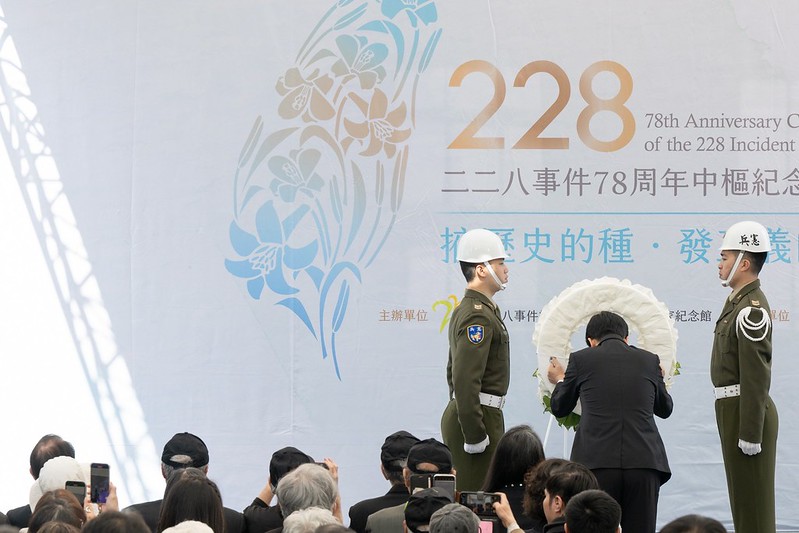
2025-02-28
President Lai attends ceremony marking 78th anniversary of 228 Incident
On the morning of February 28, President Lai Ching-te attended the nation’s main memorial ceremony marking the 78th anniversary of the...
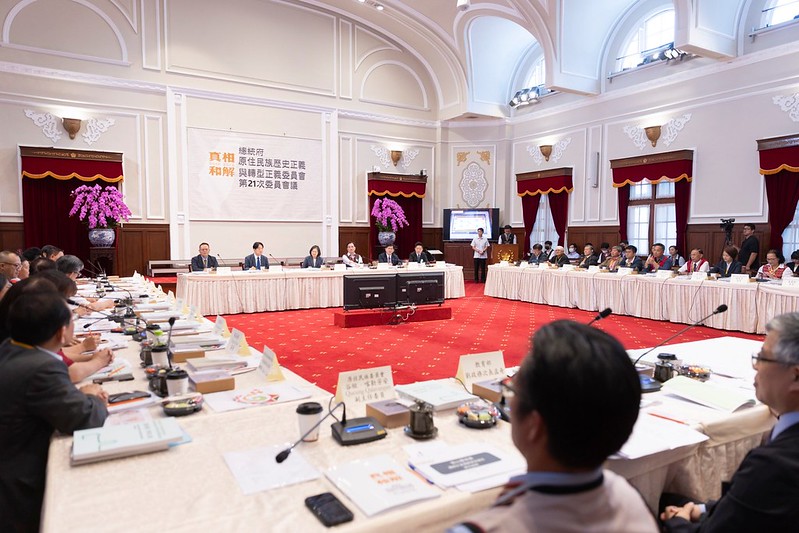
2024-05-10
President Tsai presides over 21st meeting of Presidential Office Indigenous Historical Justice and Transitional Justice Committee
On the afternoon of May 10, President Tsai Ing-wen presided over the 21st meeting of the Presidential Office Indigenous Historical Justice a...
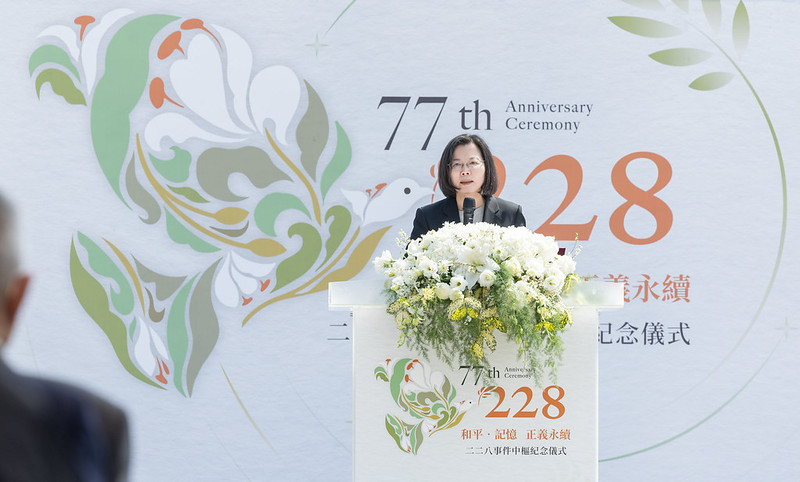
2024-02-28
President Tsai attends ceremony marking 77th anniversary of 228 Incident
On the morning of February 28, in Chiayi County, President Tsai Ing-wen attended the nation's main memorial ceremony marking the 77th an...
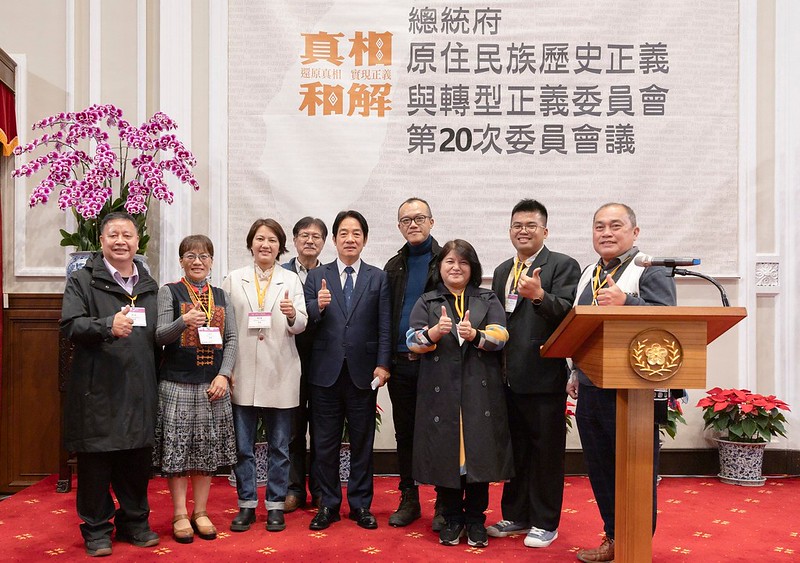
2023-12-04
News release following 20th meeting of Presidential Office Indigenous Historical Justice and Transitional Justice Committee
On December 4, President Tsai Ing-wen convened and presided over the 20th meeting of the Presidential Office Indigenous Historical Justice a...
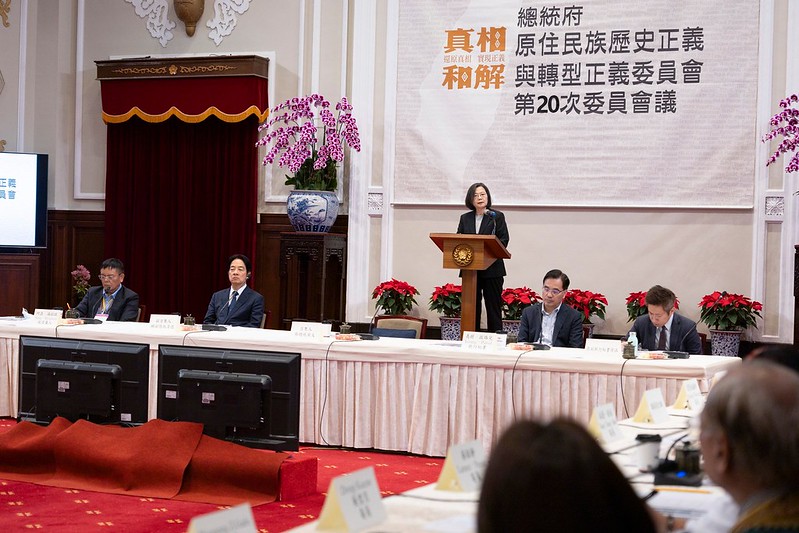
2023-12-04
President Tsai presides over 20th meeting of Presidential Office Indigenous Historical Justice and Transitional Justice Committee
On the afternoon of December 4, President Tsai Ing-wen presided over the 20th meeting of the Presidential Office Indigenous Historical Justi...



